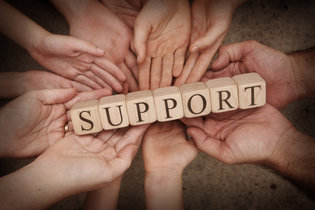Do you need assistance with mental health and wellbeing?
With the varying emotional responses surrounding COVID-19, this is the time to show solidarity as a community.
Remember: Reactions of concern, anxiety, fear, sadness, anger and denial are completely normal.
Explaining to Children
Children absorb information from the news, social media and discussions adults have around them. The best way is to be open and honest with children, sharing information in small amounts showing that you trust and value them, in-turn also helping to enhance their resilience.
Maintaining a positive and realistic outlook on COVID-19 and isolation:
- Remind yourself that this is a temporary period of isolation which in time will be over.
- Acknowledge that stress can impact anyone during and after such adversity and it is understandable to be stressed right now.
- While you might feel uncertain right now, it is important you have faith in the competency of the scientific community to give you the best advice and care for you and your family’s heath.
- Connecting more with your cultural identity and having faith in your own ability to get through this tough time will help boost your resilience.
- Maintain a realistic and practical perspective. Don’t expect yourself to be excelling in work or study right now or staying at your normal standard of productivity.
- If you have been put into quarantine or are self-isolating recognising this challenge, knowing you will overcome it, and giving yourself time to relax and recover in this time period is vital.
- This is an opportunity to slow down and reflect on what makes you happy in life. Learn about the factors that affect your physical and mental health during the outbreak.
Ways to reduce stress in isolation:
- Do some deep breathing and meditation to calm your mind.
- Try journaling about this experience, it might teach you something new and it will help you better understand your emotions, concerns, and mental wellbeing.
- Try to maintain a regular sleep routine and healthy diet.
- Use this time to focus on things you love and enjoy that have maybe been neglected recently.
- Do something fun like playing some online games, arts and crafts, play some music, or cook a creative dish. Do something that makes you laugh!
- Practice gratitude: while it might feel hard to find things to be grateful for in times like these, you can also use adversity to boost your gratitude for simple things like family and friends, the natural environment, good health, your food, and your favourite book. This helps to boost resilience and open our eyes to the broader picture.
Remember that support agencies are here to help
- Beyond Blue: 1300 224 636
- Lifeline: 13 11 14
- Lives Lived Well: 1300 789 978
- Suicide Call Back: 1300 659 467
- Rural and Remote Mental Health: 0400 104 332
- Self-Isolation Support: 1800 173 349
For information on how to look after yourself in a crisis see the Queensland Health website.
To find out how to stay connected while being physically apart, along with wellbeing in the time of social distancing see the Queensland Health website.
South Burnett Regional Council reminds residents to follow the Queensland Government messaging: If you are sick, stay home; if you're feeling unwell with symptoms of COVID-19, you should contact your doctor about being tested; practice social distancing; continue good hygiene practices.


